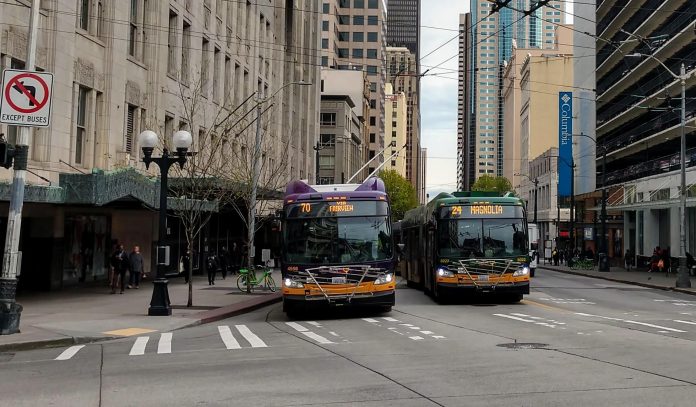
Transit agencies and riders alike in the Puget Sound can breath a sigh of relief, now that the federal government is providing emergency funding relief. Hundreds of millions of dollars have been dispersed for regional transit use to cope with plummeting revenues.
For weeks, transit agencies in the Puget Sound have been cutting service as ridership has fallen due to spread of the novel coronavirus and staffing challenges have arisen. King County Metro, for instance, recorded a 72% ridership drop for the last full work week of March as compared to the same time in 2019 and Transit App has indicated that ridership among its users in Seattle was down about 80% several days last week. Along with this, local tax revenues have taken a big hit with closed businesses and would-be customers staying home. Fewer riders had initial also meant some reductions in fare revenue but most transit agencies have since suspended fares entirely to reduce contact with operators and assist riders who may be experiencing their own economic stress from joblessness.

This financial predicament had been widespread across the country by mid-March, leading the American Public Transportation Association to urge that Congress provide emergency relief funding to the tune of $16 billion in order to cover operational costs. As an economic relief bill, called the Coronavirus Aid, Relief, and Economic Security (CARES) Act, worked its way through Congress, Democrats strongly pushed for the inclusion of transit funding and ultimately that call was answered.
Emergency transit funding came through to the tune of $25 billion for transit agencies from coast to coast with some flexibility for funding to be used for capital investments as well. This comes on top of the $8.9 billion already allocated for the 2020 fiscal year for the Urbanized Area Formula Grants, Rural Area Formula Grants, State-Of-Good-Repair Formula Grants, and and Growing/High-Density States Formula Grants. Transit agencies will be able to apply the emergency funding to costs incurred as far back as January 20th.
On Friday, the Puget Sound Regional Council (PSRC)–the regional body responsible for doling out federal transportation funding to King, Pierce, Snohomish, and Kitsap Counties–announced that the CARES Act would deliver about $538.5 million in local funding for transit agencies consistent with federal funding formulas. Eleven transportation agencies serving the region will be eligible for funding. Though final allocations are yet to be determined, the PSRC has indicated that the preliminary allocations could wind up as follows, though they could change slightly by agency:
- $242.8 million for Metro;
- $166.9 million for Sound Transit;
- $39.9 million for Washington State Ferries;
- $38.0 million for Community Transit;
- $20.9 million for Pierce Transit;
- $13.2 for Kitsap Transit;
- $7.2 million for Intercity Transit (an additional $10.5 million is allocated directly from the federal government);
- $3.1 million for Everett Transit;
- $2.7 million for Pierce County (for ferries);
- $2.4 million for Seattle; and
- $1.1 million for Skagit Transit (an additional $5.9 million is allocated directly from the federal government).
Together, this represents a total of $554.8 million in emergency funding.
An important attribute about this emergency funding is that it is generally provided as full grants, meaning that transit agencies do not have to do cost-sharing with the federal government in order to be eligible to receive the full funding grants. In other words, as long as the funding is used by transit agencies to aid in their response to the novel coronavirus epidemic and operations, the funding is a direct supplemental grant. Depending upon how this national epidemic emergency evolves, it may necessitate further federal and even state aid to keep transit agencies running to provide essential services to their communities.
Stephen is a professional urban planner in Puget Sound with a passion for sustainable, livable, and diverse cities. He is especially interested in how policies, regulations, and programs can promote positive outcomes for communities. With stints in great cities like Bellingham and Cork, Stephen currently lives in Seattle. He primarily covers land use and transportation issues and has been with The Urbanist since 2014.

